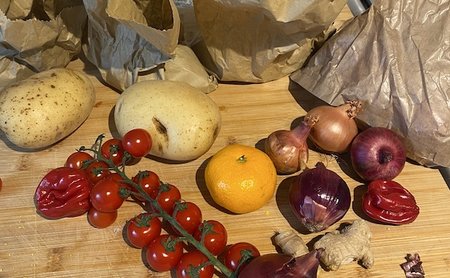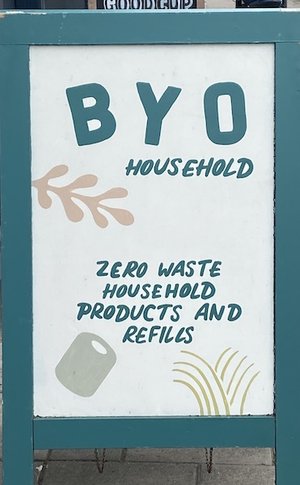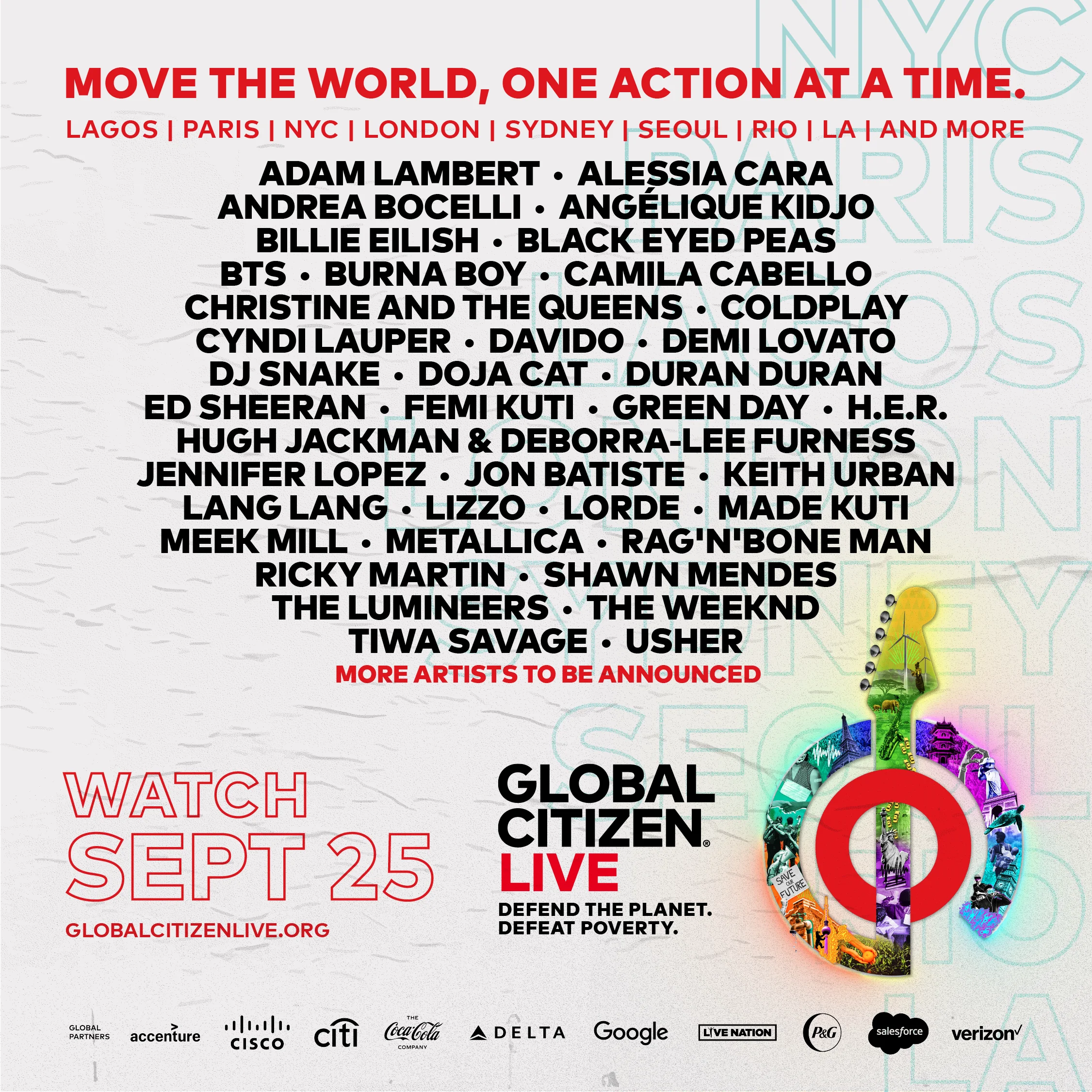The next 10 years will be decisive for action on the climate crisis. Unprecedented change is needed for carbon emissions to be halved by 2030 and the world to reach net-zero by 2050. Reaching those goals are vital to limiting world temperature rises to no more than 1.5 degrees warmer than pre pre-industrial levels, a key benchmark for countries to aim for under the Paris climate agreement.
It’s important for everyone, particularly those who can afford to in wealthy countries who have done the most to cause climate change, to actively try to curb their carbon footprint to help achieve these aims. Here’s what happened when UK Global Citizen writer Helen Lock spent a month doing just that.
I signed up to this month-long challenge fairly breezily. I knew it would definitely involve some changes, but how hard can it be? We’re all aware we could be doing more to lessen our impact on the planet, and I often have thoughts like “I must recycle that” or “I really should go for the plant burger”. So this month I figured that all I really needed to do was listen to that voice.
But, of course, that’s easier said than done. Those thoughts can be forgotten in the moment, with packaging tossed in the bin when you rush out the door, or when you’ve seen your absolute favourite go-to dish on the menu, and it's not vegan-friendly.
And, like any time you’re learning something new, scratch the surface and you soon find more challenges arise. I definitely experienced a learning curve this month.
My carbon footprint
To start with, I wanted to figure out my current carbon footprint. There are lots of carbon footprint calculators out there, the environment non-profit WWF has a questionnaire or you can head to carbonfootprint.com for a detailed assessment. Or you can download the Klima app which teaches you more about carbon off-setting too.
I opted to use Giki Zero — Giki stands for “Get Informed, Know your Impact” — as it comes with a lot of tips and advice. Thanks to its game-like system of gaining “Giki points” for each type of action you take ranging from “quick wins” to “big changes” it’s easy to start feeling like you’re making progress. As you “complete” actions you watch your footprint, shown as your average annual emissions, start to lower on a graph in the progress dashboard.
My carbon footprint was estimated at 5,067 kg of carbon emissions per year after I plugged in estimates on water usage, gas usage, heating, travel habits, and diet.
It’s more than twice as high as the 2.5 tonnes (2,500 kgs) of carbon each year that Giki Zero recommends everyone cut down to by 2030 in order to succeed in limiting global warming to no more than 1.5 degrees Celsius.
However, my carbon footprint is lower than the UK average of nine tonnes, the app says, almost certainly because I don’t have a car. I feel a bit smug about that but I also know the estimate is probably on the low side.
There is certainly more exact information I could put into the calculator about the running of my house, instead of guessing, for example, or about the services I use (there’s the option to add details of your financial services like banking). And I’m doing this challenge during the COVID-19 pandemic which feels like cheating.
Restrictions are lifting in the UK, but my lifestyle is still different to normal. During the past month I’ve travelled a bit on public transport and taken just one Uber. Using my bike to cycle more, one of my aims for the month, was ridiculously easy because I don’t have many places to go and because it's summer. Flying is a huge carbon emitter that I know I need to be more conscious of in non-COVID-19 times.
The app also suggests refurbishments people can take to make their home more sustainable but since I live in rented accommodation I can’t control much of that.
I speak to Jo Hand, the co-founder of Giki Zero for some advice. “There are always things that are easier for some people than others, for example, living in rented accommodation or halls of residence then it’s hard to make some changes,” she says. “Some people live in the countryside and can’t really manage without a car. So it’s about looking at what’s achievable for you and starting there.”
“It’s a gradual process,” she adds, “you won’t just wake up one morning and have a completely sustainable lifestyle.”
Food
There are definitely changes I can make though and all the climate advice says eating less meat, and switching to a more plant-based diet is one of the biggest ways you can reduce your carbon footprint, so I work on that basis.
According to Giki, our food habits represent 32% of our carbon emissions, that's things like diet and food waste. Vegan diets create 45% less carbon than a typical diet, so the impact is significant.
I commit to being vegetarian, switch to plant-based milk, which has a considerably lower impact than dairy, buy a bunch of organic vegetables and grains at my next shop.
I *might* have forgotten my new veggie diet at the pub on the first weekend though – when I accidentally ordered a pepperoni pizza. However I discovere a new favourite recipe of a lemony lentil and chickpea salad with fried halloumi in the first week too.

I start taking my reusable coffee cup and water bottle everywhere. I had not been using the coffee cup because some coffee shops weren’t keen on them for hygiene reasons during the pandemic, but that’s changed now and remembering it each day is definitely an easy win, earning me two Giki points.
Giki Zero estimates 100kg of carbon a year can be saved by one person recycling everything they can each week — meanwhile, only 1 in 400 coffee cups gets recycled, meaning over 300 million go to landfill every day globally.
I hadn’t ever really considered why organic produce is better for the environment before, instead I saw it more as a personal preference. But it turns out buying organic is recommended to lower my environmental impact and while it’s pricier, I save money by not buying meat or fish.
Organic farms don’t use the chemicals fertilisers that are used in conventional farming, which often runoff from fields into water, creating “dead zones” in rivers and ponds as it causes too much algae to bloom which suffocates marine life.
However, like with so many seemingly good choices, there is a debate among scientists about whether organic farming truly works sustainably as a food system. It has been criticised for having lower crop yield for the amount of land used, and for making food more expensive.
But I think about what the Soil Association says about how good organic farms are for biodiversity allowing birds and bees to thrive, and the fact that Britain is one of the most nature depleted countries in the world, with 30% of its birds threatened with extinction, and decide it has to be the right way to go.
In the first couple of weeks, I found some tips and tricks for using less carbon that surprised me. Did you know that steaming vegetables in the microwave is actually way less carbon intensive than on the hob for example? Microwaves can save up to 50% on carbon emissions compared to the hob. Keeping lids on cooking pans is also a very easy step to use less energy too.
Hand tells me that these relatively small actions can add up to making a difference if done consistently. “Driving at 50mph rather than 70mph on the motorway can reduce carbon emissions significantly, [and] similarly heating your home one degree less in winter makes a big difference,” she says.
I try to move towards being properly vegan too, which is hard because I love cheese. But eventually I got hold of some vegan "shawarma meat", vegan “chicken slices”, falafel and hummus, and so some decent options are back on the menu and cheese sandwiches are a distant memory. By the end of the month I’ve come far, and find myself tucking into a vegan burger while watching the Euro 2020 final in the pub, potentially saving myself 130 times less carbon than a beef burger!
Packaging and household stuff
All this vegan fake meat is wrapped in plastic so I’m now facing another issue. I've been making even more of a concerted effort to recycle, but actually dealing with how much packaging comes with everything does pose a real challenge.
The UK has a serious problem with plastic waste. The country doesn’t have the capacity to recycle all of it yet, and so the government has shipped tonnes of it to countries like Turkey where it ends up being dumped and burned. I want to contribute as little as possible to this if I’m seriously going to lower my carbon footprint.
To tackle packaging I first run down everything I have in my house in terms of shampoo and cleaning products instead of aimlessly purchasing more.
I then get a chance to go to my local “zero waste” store, which proves to be an amazing resource. There I refill my washing up liquid bottle with one of their brands, and buy an easy to refill glass bottle and fill it with shampoo. I can see it will last for ages, and I will be able to take it back and refill it when it does run down.

I also stock up on vegetables that haven’t got plastic wrapping, and plan to come back with containers for staples like pasta which I’m starting to run out of.
This part of the challenge is quite hard though and it makes me think about how annoying it is that ordinary supermarkets contain so many items covered with a kind of plastic film that is not currently possible to recycle, meaning it all has to go to landfill. Not everyone has the time to find and go to boutique stores that close at 6pm like the awesome zero-waste one I found, so convenience is key if everyone is really going to live more sustainably.
At the end of the month considering the vegan diet, the cycling and the recycling/reusing I’ve done, my Giki dashboard says I’ve cut my average annual carbon footprint by about a tonne to 4,000 kg per year, mostly thanks to diet it seems, as that racks up the most points.
Behaviour change
Concepts such as trying to lower your personal carbon footprint or using carbon off-setting have been criticised for letting big polluting industries off the hook, making it too easy for them to continue business-as-usual.
I agree that shifting the burden of change entirely to individuals when governments and industry hold the real power is wrong on its own — at the same time, it would be ridiculous for someone with the financial and time privilege that I have not to try to cut carbon. As climate reporter Emily Atkin, writer of the daily climate newsletter Heated, says, when people ask what they can do to help, her answer is “anything.” At this point in the game, it’s all hands on deck.
There lots of policy change that would help like a four-day working week so people don’t have to rush for the most convenient options or a proper ban on single-use plastic — but I feel motivated to try to continue the action I’ve taken because at scale everyone’s choices can push the dial, and, really, it wasn’t that hard.
You can join the Global Citizen Live campaign to defeat poverty and defend the planet by taking action here, and become part of a movement powered by citizens around the world who are taking action together with governments, corporations and philanthropists to make change.
